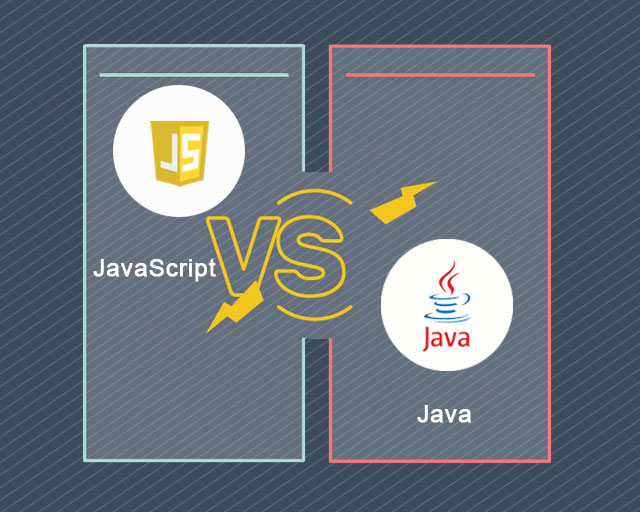With the use of the word “Java” in JavaScript, most of the people assume that its anyhow related! This coupling got programmers quite a headache. These two programming languages did come together for a small, and that was only during the early part of Netscape.
The rise of these two programming languages has been extremely different. Yes, you might be looking for even clear information to understand the difference, and here in this article, we have tried to help you with it.
There was a time when people explained Java is a programming language taken in consideration for an application development needs and Javascript was taken into usage by developers and designers to add animation on the website making it more interactive. However, with time, Javascript has evolved big time, and there are many more differences in the context.
Java As stated above, Java is a functional programming language used for web application development needs. It came into existence in 1991, when many software engineers today were not even born. It took more than two years for the creators to realize that it can even play a more prominent role in web browsers.
Javascript is a scripting language taken into consideration by developers to make websites interactive and dynamic. This language came into existence during the ’90s, and it was through a project which was initiated by Netscape Communications. In 1995, the corporation desired to make the website experience even more engaging, and it evolved in the form of Javascript.
Java and JavaScript were not planned. Javascript was more easy to understand and use. Both the languages were born to exist together. Java programming language was more focused on the development of enterprise level applications while JavaScript was intended to target minor client-end needs.
JAVA VS. JAVASCRIPT: DIFFERENCES
Java and JavaScript were created early for entirely different objectives. Java was developed to serve as a programming language which can be used to build applications while JavaScript was created to design the interface of the website in a more dynamic way.
Here are the few of the significant differences in the respective languages, take a look:
Compiled vs. Interpreted
When it comes to Java, it is a compiled programming language. It is exclusively compiled into bytecode and then implemented to run on the JVM- Java Virtual Machine.
Whereas when we talk about JavaScript, it is an interpreted scripting language. This language interpreted in the way it has designed and executed directly by a browser.
Static vs. Dynamic Type Checking
Java considers using static type checking. In this process, during the compilation time, the variable type is checked. Here the program has to define the type of variable they are about to develop.
On the other hand, like every other scripting language, JavaScript also considers dynamic type checking. Here during the run time, the verification of the type of safety is executed. The program should define the type of variable they are going to create.
There are many advantages and disadvantages related to both the mentioned process, but the static type checking holds an edge over the later. In this process, the type errors get caught in the early part of development. Due to this, codes are executed quicker with less usage of memory. When it comes to dynamic type checking, it helps in productivity as the programmer can assign types anytime as per the needs.
Concurrency:
The process to manage the execution of many instruction sequences and that too at the same time is quite different in both the languages.
When it comes to Java, this programming language uses multiple threads to get the task executed smoothly all at the same time.
In server-side applications, JavaScript is there in the form of Node.js, and it exclusively manages the execution of the several instruction sequences by the queue system, and the whole process acknowledges as an event loop.
We can say that both processes are just good enough to be taken into consideration. However, yes, Java comes out with quicker results than JavaScript.
Projects To Consider Java And JavaScript:
As mentioned earlier, both the programming languages are poles apart from each other and used to achieve a completely different purpose in the project. Therefore there is no room for comparison. Listed below are the type of projects where you can opt these programming languages.
You must opt for Java programming language if your project comprises of:
Enterprise Software
Android Apps
Big Data Analytics
Scientific Computing
Server-Side Technologies in the form of JBoss, Apache, GlassFish, Geronimo.
General Purpose Programming of Hardware
You must opt for JavaScript programming language if your project comprises of:
Front-End technologies in the form of AngularJS, ReactJS, jQuery, Ember.js, Backbone.js
Dynamic single page applications (SPAs)Mobile App Development with the help of React Native, PhoneGap.
Server-Side technologies in the form of MongoDB, Node.js, Express.js
Final Thoughts
We hope that this post has continued in the form of a definitive guide to understanding the difference between Java and JavaScript. Both the languages are entirely different in their aspect; one can be used for most Java application development and backend development while the other one can be used to develop a practical and interactive web application which can run on different browsers.
Author
[simple-author-box]
Discover more from DigiPro Marketers
Subscribe to get the latest posts sent to your email.

